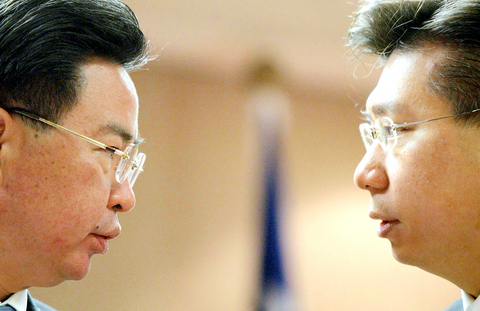The People First Party's (PFP) draft cross-strait peace bill and the Taiwan Solidarity Union's (TSU) draft anti-invasion peace bill passed a preliminary review at the legislature's Home and Nations Committee yesterday, but most of the bills' articles were put aside because of sharp differences of opinion.
The parties agreed to talks to address differences on the contentious articles before sending them to the plenary legislative session for second and third readings.
The TSU's 11-article anti-invasion peace bill states that Taiwan has existed alongside China since the founding of the People's Republic of China, and that any change to the status quo or any action to strip the nation of its sovereignty would not be tolerated by Taiwanese or the international community.

PHOTO: LIN CHENG-KUN, TAIPEI TIMES
The draft also says that the government should call a referendum and amend the Constitution to safeguard Taiwan's sovereignty if the cross-strait status quo is threatened. The government could also use "non-peaceful" means to resist China's annexation, the draft states.
The PFP argued that it was not necessary to enact the law because existing legislation has similar provisions. It also said that the use of the word "Taiwan" rather than the official national title in the bill was bound to cause confusion and controversy.
But they praised the TSU's patriotism and its attempt to enact the law.
The Democratic Progressive Party (DPP) proposed an additional paragraph to the bill, which stated that the government must obtain more weapons for the sake of national security.
Calling the PFP's proposed negotiation committee in its cross-strait peace bill a "monster," TSU Legislator David Huang (
"It clearly encroaches on the president's constitutional authority to set cross-strait policy as well as the executive authority of the Mainland Affairs Council," Huang said. "I'd very much like to know what they plan to do when the president's decision clashes with those made by the council."
DPP Legislator Huang Chao-hui (
Chang Hsien-yao (張顯耀), the head of the PFP policy research department, however, said that establishing the council was necessary because the Mainland Affairs Council and its "white glove," the Straits Exchange Foundation, were no longer competent to handle cross-strait affairs.
According to the bill, a 17-member council must be established and several "peace ambassadors" must be elected among council members to conduct cross-strait negotiations and address 11 cross-strait policy issues.
They include signing an agreement about direct transportation links, the establishment of a demilitarized zone, the inking of an accord to protect China-based Taiwanese businesspeople, the setting up of a cross-strait free trade zone, the holding of a cross-strait summit and the signing of a peace accord with China.
Decisions arrived at by council members and "peace ambassadors" would be legally binding, and council members would be appointed by political parties in proportion to representation in the legislature.

‘DENIAL DEFENSE’: The US would increase its military presence with uncrewed ships, and submarines, while boosting defense in the Indo-Pacific, a Pete Hegseth memo said The US is reorienting its military strategy to focus primarily on deterring a potential Chinese invasion of Taiwan, a memo signed by US Secretary of Defense Pete Hegseth showed. The memo also called on Taiwan to increase its defense spending. The document, known as the “Interim National Defense Strategic Guidance,” was distributed this month and detailed the national defense plans of US President Donald Trump’s administration, an article in the Washington Post said on Saturday. It outlines how the US can prepare for a potential war with China and defend itself from threats in the “near abroad,” including Greenland and the Panama

The High Prosecutors’ Office yesterday withdrew an appeal against the acquittal of a former bank manager 22 years after his death, marking Taiwan’s first instance of prosecutors rendering posthumous justice to a wrongfully convicted defendant. Chu Ching-en (諸慶恩) — formerly a manager at the Taipei branch of BNP Paribas — was in 1999 accused by Weng Mao-chung (翁茂鍾), then-president of Chia Her Industrial Co, of forging a request for a fixed deposit of US$10 million by I-Hwa Industrial Co, a subsidiary of Chia Her, which was used as collateral. Chu was ruled not guilty in the first trial, but was found guilty

A wild live dugong was found in Taiwan for the first time in 88 years, after it was accidentally caught by a fisher’s net on Tuesday in Yilan County’s Fenniaolin (粉鳥林). This is the first sighting of the species in Taiwan since 1937, having already been considered “extinct” in the country and considered as “vulnerable” by the International Union for Conservation of Nature. A fisher surnamed Chen (陳) went to Fenniaolin to collect the fish in his netting, but instead caught a 3m long, 500kg dugong. The fisher released the animal back into the wild, not realizing it was an endangered species at

DEADLOCK: As the commission is unable to forum a quorum to review license renewal applications, the channel operators are not at fault and can air past their license date The National Communications Commission (NCC) yesterday said that the Public Television Service (PTS) and 36 other television and radio broadcasters could continue airing, despite the commission’s inability to meet a quorum to review their license renewal applications. The licenses of PTS and the other channels are set to expire between this month and June. The National Communications Commission Organization Act (國家通訊傳播委員會組織法) stipulates that the commission must meet the mandated quorum of four to hold a valid meeting. The seven-member commission currently has only three commissioners. “We have informed the channel operators of the progress we have made in reviewing their license renewal applications, and